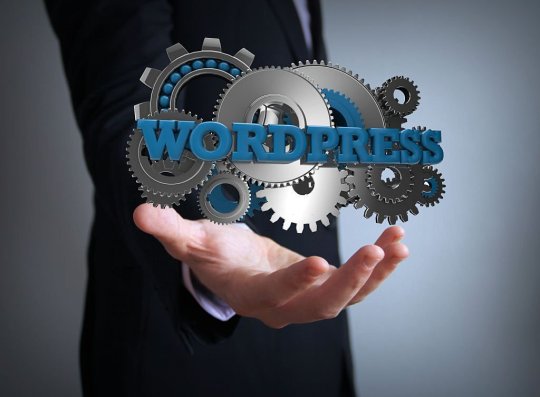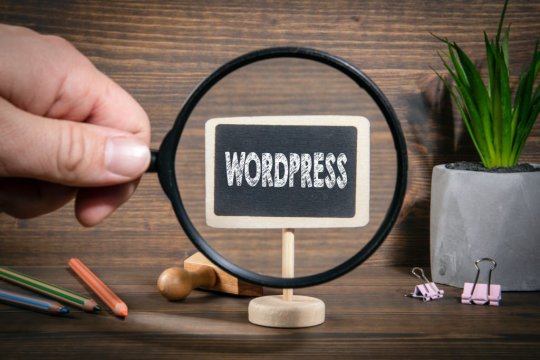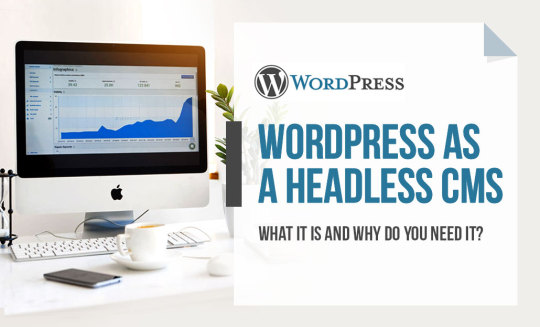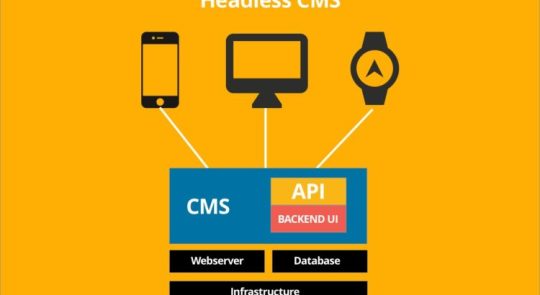We empower content and development teams with the flexibility and ubiquity of WordPress—the agile CMS that powers more than 40% of the web—while ensuring the security and reliability organizations need to operate at enterprise scale.Website:- https://wpvip.com/
Don't wanna be here? Send us removal request.
Text
What Is a WordPress Headless Content Management System?
Introduction of WordPress Headless WordPress headless CMS is a newer type of setup for WordPress sites. In this article, discover what the difference is between a headless content management system and a regular one, whether you should consider changing your current setup if it’s not headless, and more! What Is a WordPress Headless Content Management System? A WordPress Headless Content Management System (HCCMS) is a web application that allows you to manage your content without the need for a web server. This means that you can manage your content without needing to be connected to the internet. HCCMSs are useful for managing content in areas where bandwidth or security restrictions prohibit you from having a web server installed.

Benefits of a WordPress Headless CMS A WordPress headless CMS (or “content management system” without a website interface) is a great option for bloggers who want to manage their content in a centralized way, without having to worry about front-end design or maintaining a separate blog engine. Here are some of the benefits of using a WordPress headless CMS: 1. Increased Efficiency: A headless CMS makes content management easier than ever, freeing up your time to focus on writing and promoting your content. You can easily add new articles, edit existing ones, and keep track of all changes with ease. 2. Greater Control: A headless CMS gives you complete control over your content, allowing you to customize each individual article exactly the way you want it. This means no more guesswork or missed opportunities – you can be sure that every piece of content on your site is accurate and up to date. 3. More Flexible Design Options: A headless CMS lets you use any design style you want without worrying about how it will look on your website. This means you can create a unique brand for your blog without having to rely on someone else’s design decisions.
This Post Was Originally Published Here:- https://www.crwenewswire.com/what-is-a-wordpress-headless-content-management-system/
0 notes
Text
How to Successfully Use WordPress Analytics?
Introduction of WordPress Analytics WordPress analytics is an important part of any website owner’s toolkit. By understanding how your site is being used, you can make better decisions about how to improve your site and its content. This article will break down the top WordPress analytics tools and use cases, as well as provide useful tips for using them effectively. What Is WordPress Analytics?

WordPress analytics is a free and easy way for you to understand how your blog is performing. By logging into your WordPress account, clicking on the “Stats” link on the main dashboard, and entering your unique URL, WordPress will collect all of the information it needs to generate analytics reports. These reports include detailed information on your blog traffic, demographics, and posts/page views. WordPress analytics can be very informative when used correctly. For example, knowing that my blog attracts primarily women between the ages of 25-34 can help me tweak my content marketing strategy accordingly. Additionally, knowing that my most popular post is about DIY craft projects can help me decide which topics to focus on next. There are a few things you should keep in mind when using WordPress analytics: 1) Make sure you have permission to collect data from your visitors. By default, WordPress will collect information on all website visitors who visit your blog via the “Stats” link in the dashboard. If you do not want WordPress to collect this data, you will need to change your blog’s privacy settings. 2) Do not rely solely on WordPress analytics to determine your blog’s success.
This Post Was Originally Published Here:- https://hoonskate.com/how-to-successfully-use-wordpress-analytics/
0 notes
Text
How to Make WordPress Your Next Content Management System?
Introduction of WordPress CMS Support WordPress is a content management system (CMS) that enables you to create a website or blog from scratch or to improve an existing website. With it, you can easily produce professional-looking websites and blogs with ease. It’s easy to set up and use WordPress, so you’ll be able to manage your site without any headaches.

What Is WordPress? WordPress is a content management system (CMS) that enables you to create a website or blog from scratch or to improve an existing website. WordPress CMS support is free and open source software released under the GPLv2. WordPress is used by millions of people all over the world, including many large publishing companies and organizations such as The Guardian, Forbes, and The New York Times. WordPress is one of the most popular content management systems on the internet. It has a library of plugins that enable you to add features to your site, and there are thousands of themes available to customize your site’s look and feel. WordPress also has its own built-in editor which makes it easy to create and manage your content. Why Choose a Content Management System? WordPress is the most popular content management system on the web. It’s free and easy to use, making it perfect for small businesses and bloggers who don’t have time to learn a more complex system. WordPress also has an enormous plugin library, so you can customize your site to fit your specific needs.
This Post Was Originally Published Here:- https://www.evrewares.com/how-to-make-wordpress-your-next-content-management-system/
0 notes
Link
WordPress is a content management system (CMS) that is widely used by bloggers and website owners all over the world. It is a free and open source software released under the GPL. WordPress is used by more than 60 million websites, including The New York Times, Forbes, and The Guardian.
In this article, we will show you how to see your WordPress analytics in 2022.
First, you will need to install the Jetpack plugin. Jetpack is a plugin developed by WordPress.com that provides a vast array of features for WordPress websites. It includes features such as site stats, security, backup, and more.
Once you have installed Jetpack, you will need to connect your WordPress website to WordPress.com. To do this, go to Jetpack > Settings and click on the “Connect to WordPress.com” button.
Next, you will need to enter your WordPress.com username and password.
Once you have connected your website to WordPress.com, you will be able to see your WordPress analytics in the WordPress.com Stats section.
Here you can see how many visitors your website has had, where they are coming from, what devices they are using, and more.
This Post Was Originally Published Here: https://www.danieledelnero.com/how-to-see-your-wordpress-analytics-in-2022/
0 notes
Link
The Guide to enterprise cms platform is an eBook that provides an overview of the ECM market and describes the benefits of ECM for organizations. The Guide also includes a buyer’s guide to help organizations select the right ECM solution for their needs.
Enterprise content management (ECM) is a term used to describe a range of systems and approaches used to manage the creation, capture, storing, distribution, and governance of electronic documents and data.
ECM can provide organizations with a number of benefits, including:
– improved efficiency and productivity;
– improved compliance with regulations;
– improved decision-making; and
– reduced costs.
This Post Was Originally Published Here: https://arzelles.net/the-guide-to-enterprise-content-management-software-platform/
0 notes
Text
How to Find a WordPress CMS Support?

Introduction
For those who are looking for some extra help with their website, this article will give you some tips on how to find a WordPress website support team.
If you’ve decided to go down the route of self-hosting your website then you’ll need to know how to find WordPress CMS Support. The support service could be for troubleshooting technical issues, updating the software, or even just providing advice on its best uses.
Three things you need to know about WordPress
If you’re looking for WordPress support, check out these three things: WordPress’ popularity, the diversity of plugins and themes available, and the number of support channels.
WordPress is one of the most popular CMS platforms in use today. According to WordPress.org, as of March 2017, there were over 370 million active websites running WordPress. That’s a lot of sites! It also means that there are a lot of people who need help with setting it up and using it.
There are a lot of plugins and themes available to WordPress users. This makes it easy to find something that will work well on your site. Plus, since so many people are using WordPress, there are usually a lot of support resources available if you need them.
One big advantage of using WordPress is that there are a lot of support channels available. You can find help on forums, chat rooms, and social media. Plus, there are plenty of tutorials and articles online to help you get started.
How do I find CMS support?
WordPress is a popular content management system (CMS) used by millions of website owners. If you’re looking for an experienced WordPress support team, or if you’re having trouble with your WordPress site, there are a few resources you can use to find help.
First, you can search for WordPress support forums and communities. This can be a great way to get advice from other WordPress users and find solutions to common problems. Additionally, many WordPress hosting providers have dedicated WordPress support teams who can help you with issues with your site. If you don’t have access to a hosting provider, or if you need more assistance than the support team at your hosting provider is able to provide, consider hiring a WordPress consultant.
Finally, if all else fails and you still can’t solve your problem, ask around on social media or in your local community for suggestions of people who might be able to help. There’s often someone out there who has experience with WordPress and can offer some guidance.
What should I expect from CMS support?
WordPress blog support is essential for many WordPress users. When trying to find a WordPress blog support, you should expect the following:
-Quick response time to your questions or issues.
-A willingness to help solve your problem.
-A deep knowledge of WordPress and its use.
In a headless WordPress configuration, the content management tools are still available, but front-end features like themes and the block editor are not. Another front-end application handles how your WordPress website actually looks. A headless setup isn’t the best solution for all WordPress users.
Visit Us for More Information:- https://www.mapleentertainment.com/how-to-find-a-wordpress-cms-support/
0 notes
Text
How to Choose an Enterprise CMS That’s Right for Your Firm?

Introduction
This article is specifically targeted toward marketing managers and other professionals in the field of digital marketing. The author provides a comprehensive overview of enterprise CMS, factors to consider when shopping for one, how to implement the platform of your choice as well as more!
What is an Enterprise CMS?
There are a variety of different enterprise content management systems (CMSS), but what is the difference between them? Many enterprise CMSs offer features like scalability, integrated marketing tools, and a wide array of integrations with other platforms. Here are three key factors to consider when choosing an enterprise CMS:
1. Capabilities: Enterprise CMS Platforms tend to have more features and capabilities than consumer-focused options. They may include features like custom design templates, customizable collaboration features, complex workflow automation, and powerful search capabilities. It’s important to understand what specific needs your business has before deciding on a CMSS, as not all options will be suitable for every organization.
2. Scalability: Enterprise CMSSs can handle large volumes of content and data with ease. They often come with built-in tools for content management, SEO optimization, and cross-platform integration. If your business anticipates growing rapidly in the future, an enterprise CMS is a good option due to its scalability and ability to integrate with other platforms.
3. Integration: One of the biggest benefits of using an enterprise CMS is its ability to integrate with other platforms and applications. This allows you to easily share content with partners and employees across your
Realities of Running a Business
Running a business is hard enough without having to worry about the technology infrastructure. But with so many options on the market, it can be difficult to decide which enterprise content management system (CMS) is right for your business. In this blog post, we’ll discuss some of the realities of running a business and how that affects your choice of CMS.
First, let’s take a look at the different types of businesses. There are three main types: small businesses, medium businesses, and large businesses. Small businesses are typically under 100 employees, medium businesses have between 100 and 500 employees, and large businesses have more than 500 employees.
Additionally, there are two types of technology infrastructures in use today: traditional IT and digital transformation. Traditional IT refers to the use of legacy systems that were built in the past and are not always optimized for modern needs. Digital transformation refers to the use of current technologies in conjunction with new services and processes to create an improved customer experience and faster time to market.
Visit Us for More Information:- https://www.crwenewswire.com/how-to-choose-an-enterprise-cms-thats-right-for-your-firm/
0 notes
Text
How to See Your WordPress Analytics in 2022 (Best Way)?

Introduction
To see the analytics that your WordPress site is giving you, you need to install a plugin. But, if you’re looking for a way to see the stats in 2022, then this article is what you need.
What is the Best Way to See Your Analytics in 2022?
In 2022, it is important to be able to see your analytics in order to improve your website’s performance. There are a number of different ways to view your analytics, and each has its own advantages and disadvantages.
The most popular way to view your analytics is through Google Analytics. This tool allows you to track the traffic on your website, the type of traffic that is visiting your website, and the conversion rates for your website.
Google Analytics also allows you to see how people are using your website. For example, you can see how many people are spending time on your website, what types of pages they are visiting, and which ads are being clicked on.
Another popular way to view your analytics is through Adobe Analytics. Adobe Analytics is similar to Google Analytics, but it also includes information about how users are interacting with PDFs and ebooks that you have published on your website.
There are a number of other ways to view your analytics. You can use tools such as Mixpanel or Crazy Egg to track user behavior on your website. You can also use tools such as ClickFunnels or LeadPages to create effective marketing campaigns.
How Do You See Your WordPress Website Analytics?
There are a number of ways you can see your WordPress website analytics. You can use the built-in WordPress analytics system, or you can use a third-party service like Google Analytics.
To view your WordPress website analytics using the built-in system, go to your WordPress admin panel and click on “Stats.” Under “Stats,” you will see a list of statistics including “Unique Visitors,” “Pageviews,” and “Bounce Rate.” You can also use this interface to track changes in your website’s traffic over time.
If you want to view your website’s Google Analytics data, you need to install the Google Analytics plugin on your WordPress website. Once you have installed the plugin, go to the “Settings” page and under “GoogleAnalytics,” enter your Google Analytics account information. You will then be able to see all of your website’s statistics, including “Unique Visitors,” “Pageviews,” and “Bounce Rate.”
How Do You See Your WordPress Website Analytics?
WordPress is a great platform for creating websites and blogs, but it can be difficult to see how your website is performing. There are several different ways to display your WordPress analytics, and each has its own advantages and disadvantages.
One way to display your WordPress analytics is to use a plugin like Google Analytics. This plugin allows you to track all of the traffic to your website through Google Analytics. This information can be used to monitor your website’s performance and make changes based on the data.
However, Google Analytics can be difficult to set up and use. It requires a sign-in with Google, and it can be difficult to find all of the information you need. Additionally, Google Analytics only tracks traffic from websites that use their tracking code. This means that some of your website’s visitors may not be tracked by Google Analytics.
Another way to display your WordPress analytics is to use a third-party tool like WebSite Auditor. This tool allows you to track all of the activity on your website through various channels, including traffic statistics, user behavior, and site performance metrics.
WebSite Auditor has many features that are missing from Google Analytics, such as support for multilingual websites, custom reports, and exportable reports.
What Is the Best Way to Display Your WordPress Analytics?
WordPress is a great platform for creating websites and blogs, but it can be difficult to see how your website is performing. There are several different ways to display your WordPress analytics, and each has its own advantages and disadvantages.
One way to display your WordPress analytics is to use a plugin like Google Analytics. This plugin allows you to track all of the traffic to your website through Google Analytics. This information can be used to monitor your website’s performance and make changes based on the data.
However, Google Analytics can be difficult to set up and use. It requires a sign-in with Google, and it can be difficult to find all of the information you need. Additionally, Google Analytics only tracks traffic from websites that use their tracking code. This means that some of your website’s visitors may not be tracked by Google Analytics.
Another way to display your WordPress analytics is to use a third-party tool like WebSite Auditor. This tool allows you to track all of the activity on your website through various channels, including traffic statistics, user behavior, and site performance metrics.
WebSite Auditor has many features that are missing from Google Analytics, such as support for multilingual websites, custom reports, and exportable reports.
What Is the Difference Between Page Views and Visitors?
Pageviews and visitors can be confusing because they are both measurement terms used by WordPress enterprises. Pageviews are the total number of times a visitor visits a particular page on your site. Visitors are the total number of people who visit your site, regardless of how many times they visit that page.
The best way to see your WordPress analytics is to track page views and visitors separately. This will give you more accurate information about what pages are attracting visitors and how long they stay on your site. WordPress enterprise markets are starting to emerge. You can use the stats to improve your website’s design or marketing strategy.
0 notes
Text
The Importance of Enterprise Content Management Systems

Introduction
Content management systems are a powerful tool for any business, providing your company with the ability to take control of your digital presence. The article discusses the benefits of using an enterprise content management system and how they can help your company grow.
What is Enterprise CMS?
Enterprise content management systems (ECMS) are software platforms that help organizations manage and publish their content in an organized, searchable, and accessible manner. ECMSs may include features such as content authoring, publishing, archiving, managing metadata, social media integration, and search capabilities. They can be used by businesses of all sizes to create and publish content across a variety of channels, including websites, blogs, e-books, and online meeting agendas.
Benefits of using an ECMS include increased efficiency and organizational effectiveness due to the streamlined process of creating, publishing, and managing content; improved customer satisfaction due to the improved visibility and accessibility of content; and reduced costs associated with duplication of effort or failure projects caused by mismanaged content.
Despite the many benefits of using ECMSs, there are several factors to consider before making a decision: the platform’s cost/benefit ratio; the organization’s specific needs (e.g., scalability, functionality); the skill level required to use the system; and compatibility with other systems in the organization.
What are the benefits of enterprise CMS?
Enterprise cms platform (ECMS) help organizations manage and publish content across their websites, intranets, and social media platforms. By automating the publishing process, ECMS can help organizations achieve several key benefits:
1. Reduced publishing time: With ECMS in place, publishers no longer need to spend time manually formatting and uploading content. Instead, Enterprise CMS Platform can take care of the grunt work for them, saving valuable time.
2. Improved organizational visibility: By managing all published content centrally, an organization can better track its online presence and ensure that all content is consistent across all channels. This improved visibility can lead to increased business value and a stronger brand.
3. Increased user engagement: With ECMS in place, your users will be able to find and access the latest content more easily. This increased engagement could result in increased conversion rates and increased bottom line profits for your organization.
Visit Us for More Information:- https://www.anonpr.net/the-importance-of-enterprise-content-management-systems/
0 notes
Text
What Is a Headless WordPress Configuration?
A headless WordPress configuration is where the front-end of the site is powered by WordPress, but the back-end uses a different platform. This can be helpful if you want to use WordPress as a content management system but don’t want to use its templating system or design features. It can also be helpful if you want to use WordPress as an API for another application.

Installing WordPress in a Headless Configuration In a headless configuration, WordPress is installed on a server without a graphical interface. This type of installation is typically used for applications that need to interface with WordPress, such as mobile apps or other websites.
To install WordPress in a headless configuration, you’ll need to use the command-line interface (CLI). The first step is to download WordPress from the official website. Next, unzip the downloaded file and navigate to the unzipped directory in the CLI. Run the following command to create a WordPress config file:
This Post Was Originally Published Here:-https://dailybusinesspost.com/headless-wordpress-configuration/
0 notes
Text
The Difference Between Decoupled and Headless Web Development
When it comes to web development, there are two main approaches that you can take: headless CMS and decoupled CMS. Both of these approaches have their own benefits and drawbacks, so it’s important to understand the difference between them before choosing which one is right for your project.

Headless WordPress web development is where you build the front-end of your website using a JavaScript framework such as React or Angular, and then the back-end is provided by a headless CMS such as WordPress or Drupal. The main benefit of this approach is that it allows for a separation of concerns between the front-end and back-end, which can make development faster and more efficient. However, one downside is that it can be more difficult to manage dependencies between the two parts of the system.
Decoupled web development is where you build both the front-end and back-end of your website as separate applications. The front-end application talks to the back-end application via an API, which means that they can be developed independently of each other. The main benefit of this approach is that it makes it easy to scale different parts of the system separately. However, one downside is that it can be more difficult to develop because you
This Post Was Originally Published Here:-https://actoutloud.org/headless-wordpress-vs-decoupled-cms/
0 notes
Link
What Is Headless WordPress? As the name suggests, Headless WordPress is a WordPress installation without a front end. In other words, it’s just the WordPress backend, without the usual WordPress front end that users see when they visit your website. This can be a great option for certain types of websites. For example, if you’re building an API or a website that doesn’t require a traditional front end, Headless WordPress can be a good option.
0 notes
Text
The Complete Guide to Headless CMS

Most people in the web development world are familiar with the term “CMS”. Content Management Systems are software applications that allow users to create and manage digital content. A headless CMS WordPress is a special type of CMS that does not have a user interface. This means that the end-user does not interact with the CMS directly, but instead interacts with the content that the CMS outputs.
There are a number of benefits to using a headless CMS. First, since the CMS does not have a user interface, it can be used to manage content on any platform. This includes websites, mobile applications, digital signage, and more. Second, because the CMS is not tied to a specific user interface, it can be used to create more dynamic and interactive content. Third, because the CMS is headless, it can be used to manage content on behalf of other applications. This makes it an ideal solution for managing content in microservices or decoupled architecture.
Choosing a headless CMS can be a daunting task. There are a number of factors to consider, such as the features that are important to you, the scalability of the CMS, and the support that is available. In this article, we will discuss the different types of headless CMSs and provide a list of the best headless CMSs on the market.
When evaluating WordPress headless CMS, there are a number of factors to consider. The first factor to consider is the features that are important to you. Some headless CMSs are more feature-rich than others. The second factor to consider is the scalability of the CMS. Some headless CMSs are more scalable than others. The third factor to consider is the support that is available. Some headless CMSs have better support than others.
Visit Us For More Information:- https://jovantodorovic.com/the-complete-guide-to-headless-cms/
0 notes
Text
What is Headless WordPress & Should You Use It?

WordPress is a content management system (CMS) that lets you easily create a website or blog from scratch, or make changes to your current website. It’s the most popular CMS in the world, and for good reason — it’s easy to use, versatile and can be customized to fit your needs.
However, one of the criticisms of WordPress is that it can be slow and bloated. This is especially true if you’re using a hosted WordPress site, rather than running WordPress on your own server.
That’s where headless WordPress comes in. Headless WordPress is a WordPress installation that doesn’t use a traditional front-end (e.g. a website or blog). Instead, the content is delivered to a separate back-end or API. This could be a website, mobile app, or even a custom piece of software.
There are several reasons why you might want to use headless WordPress:
1. You want to create a standalone website or app that doesn’t rely on WordPress.
2. You want to use a different front-end than WordPress (e.g. a custom-built website or app).
3. You want to use a different back-end or API than WordPress.
4. You want to use WordPress to power a section of a website or app, rather than the whole thing.
5. You want to use WordPress for content management, but don’t want to deal with the performance issues associated with a traditional WordPress installation.
Visit Us For More Information:- https://www.mapleentertainment.com/what-is-headless-wordpress-should-you-use-it/
0 notes
Text
Headless Cms Vs Decoupled Cms the Ultimate Guide

In the world of content management systems (CMS), there are two main types: headless CMS and decoupled CMS. So, what’s the difference? And which one is right for you?
First, let’s start with a definition of each.
Headless CMS: A headless CMS is a CMS without a front end. That is, it doesn’t include any user interface or design. Instead, its sole purpose is to manage and deliver content.
Decoupled CMS: A decoupled CMS is a CMS that is separate from the front end. In other words, the front-end and back-end are not tied together. This allows for more flexibility when it comes to design and user experience.
Headless CMS:
The pros of a headless CMS are that it is lightweight and fast. Since it doesn’t include a front-end, it doesn’t require the same amount of resources as a decoupled CMS. This makes it a good choice for websites with high traffic or for older devices.
Another pro is that because headless CMSes are becoming more popular, there are more options available and the systems are becoming more sophisticated.
Visit Us For More Information:- https://www.crwenewswire.com/headless-cms-vs-decoupled-cms-the-ultimate-guide/
0 notes
Text
Headless CMS Vs. Traditional CMS How to Pick Your Best Fit?

Content management systems (CMS) are a dime a dozen these days. But when it comes to selecting the right platform for your organization, the options can feel endless. Should you go with a traditional CMS? A headless CMS? Or maybe something else entirely?
In this article, we’ll explore the pros and cons of traditional and headless CMS options, and help you determine which platform is the best fit for your unique needs.
WHAT IS A HEADLESS CMS?
First, let’s define some key terms. A traditional CMS is a platform that typically relies on a webserver to deliver content to users. A headless CMS, on the other hand, separates the content from the presentation. This means that content can be delivered to users through a variety of channels, such as a website, mobile app, or even a chatbot.
One of the benefits of a headless CMS is that it can be more easily integrated with other systems. For example, a headless CMS could be used to manage the content for a website and a mobile app, or to power a chatbot that interacts with users on a website or in a mobile app.
Visit Us For More Information:- https://fred-e.net/headless-cms-vs-traditional-cms-how-to-pick-your-best-fit/
0 notes
Text
What Is Headless Wordpress?

As the name suggests, headless wordpress is a wordpress installation without a front end. In other words, it’s just the wordpress backend, without the usual wordpress front end that users see when they visit your website.
This can be a great option for certain types of websites. For example, if you’re building an api or a website that doesn’t require a traditional front end, headless wordpress can be a good option.
Pros of headless wordpress
1. Increased flexibility
one of the biggest advantages of headless wordpress is the increased flexibility it provides. With a traditional wordpress website, you’re limited by the wordpress front end. But with headless wordpress, you can use any type of front end you want.
This can be a great option for developers who want more flexibility in how they build their websites. It also allows you to use different front ends for different purposes. For example, you could use a different front end for your website’s home page then you use for your blog pages.
Visit Us For More Information:- https://www.anonpr.net/headless-wordpress-what-it-is-pros-cons-and-how-to-set-up/
0 notes